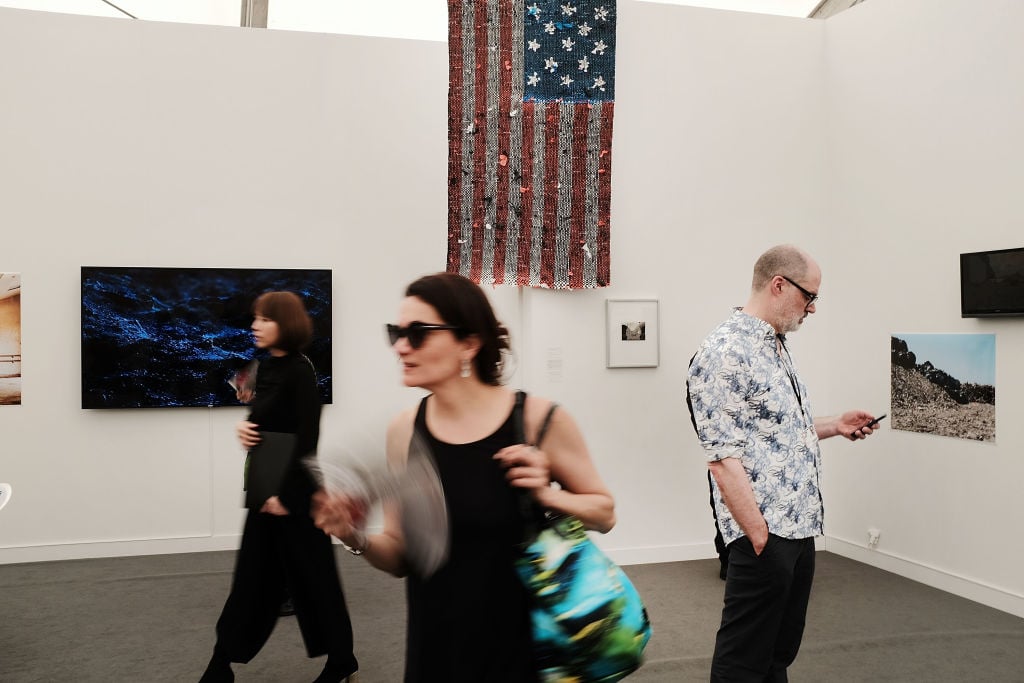
One day after Frieze organizers sent an email to the nearly 200 exhibitors at its recent New York edition offering refunds of up to 10 percent due to the excessive temperatures in its bespoke tent, Shane Campbell fired back, saying, in effect, “not good enough.”
A lawsuit filed by the Chicago gallery seeks a full refund of its fair costs. The claim, for which the plaintiffs hope to achieve class action status, requests judgment of $15 million, plus damages.
A month after the seventh edition of Frieze New York opened to VIPs on Randall’s Island, the epic and “unbearable” heat inside the tent remains a much-discussed issue. By all accounts, the tent’s cooling and ventilation system failed miserably as a heat wave hit New York, causing temperatures to soar and tempers to flare among the well-heeled crowd. The rumor mill and social media were awash with complaints and puns about the effects of the torrid atmosphere on the ability to look at, no less buy, pricey artworks.
A representative for Frieze told artnet News that Frieze has not received any formal notice of the lawsuit and therefore cannot comment.
The booth of Waddington Custot at Frieze New York 2018. Photo courtesy Henri Neuendorf.
The lawsuit, filed June 8 in US District Court for the Southern District of New York, alleges that Frieze Events breached its contractual promise by “failing to properly design, test, and regulate the ability of the air conditioning system at the Art Fair to maintain an environment within which Exhibitors could conduct commercial business.” The lawsuit, in which the gallery’s co-owner Julie Campbell is also named as a plaintiff, asserts that Frieze management admitted it was aware in advance of an impending heatwave and was expecting record-breaking temperatures “but was grossly negligent in preparing the site for such heat and ensuring a reasonably efficient air conditioning system.”
As a “direct result of the oppressive heat,” the suit says “art customers, collectors, consultants and their clients and other attendees could not remain in the site and were forced to leave.” Exhibitors “suffered substantial financial losses,” as a result. The lawsuit is seeking cancellation of the contracts that participating galleries signed and reimbursement of all sums paid for participation at the fair.
Each exhibitor paid approximately $78.50 per square foot, for booths ranging from about 431 square feet, to 1,292 square feet, according to the complaint. The gallery’s contract with Frieze is attached as an exhibit to the complaint. Further, it says, Frieze added a surcharge of up to 15 percent for “privileged locations” such as corner booths or booths on the open squares.
“This case is not about us,” according to a statement from Julie Campbell given to artnet News via her attorney, Lewis Saul. “It’s about holding a professional organization responsible for the losses caused by its failure to provide functional space. All the galleries invest so much to set up a booth at the fair. Frieze simply did not do their job.”
People walk through exhibits at the New York Frieze Art Fair on on May 3, 2018 in New York City. Photo by Spencer Platt/Getty Images.
Shane Campbell Gallery has exhibited at Frieze New York each year since the launch of the edition in 2012. The suit zeroes in on the new tent structure introduced this year—a series of tents forming discrete sections as opposed to the previous snaking, singular form—and the fact that air conditioning vents were relocated to the upper levels of the tents from the floor, as a key source of the problem.
However, regular visitors to the fair know that weather-related vulnerabilities are hardly a new thing. Previous editions have seen jitters about rain-driven leaks and excessive winds. Indeed, excessive heat in some prior editions of Frieze New York prompted fairgoers to amass around so-called “cool spots” in the previous tent where vents pumped out conditioned air from below.
The lawsuit claims that according to Accuweather, the outdoor temperature on Randall’s Island reached 90 degrees on May 2, 93 degrees on May 3, and 84 degrees on May 4.
While some visitors “unable to bear the heat” were forced to exit the tent, others canceled their planned appointments and “many people became ill from the conditions,” the lawsuit asserts.
The action at the New York Frieze Art Fair on on May 3, 2018 in New York City. Photo by Spencer Platt/Getty Images.
After the fair, the gallery sought to negotiate a return of all fees paid to Frieze in connection with participation. Instead, the suit says, Frieze offered to return 2.5 percent of the fees the gallery paid. The plaintiffs say that the requirements for a class action are in place since “Frieze has acted or refused to act on grounds generally applicable to the Class making appropriate final injunctive or equitable relief with respect to the Class as a whole.”
The claims include breach of contract and unjust enrichment. The plaintiffs are requesting a jury trial.
Saul describes Frieze’s partial refund offer as “wholly inadequate,” adding: “We intend to litigate this to the fullest extent possible to give galleries what they deserve.”